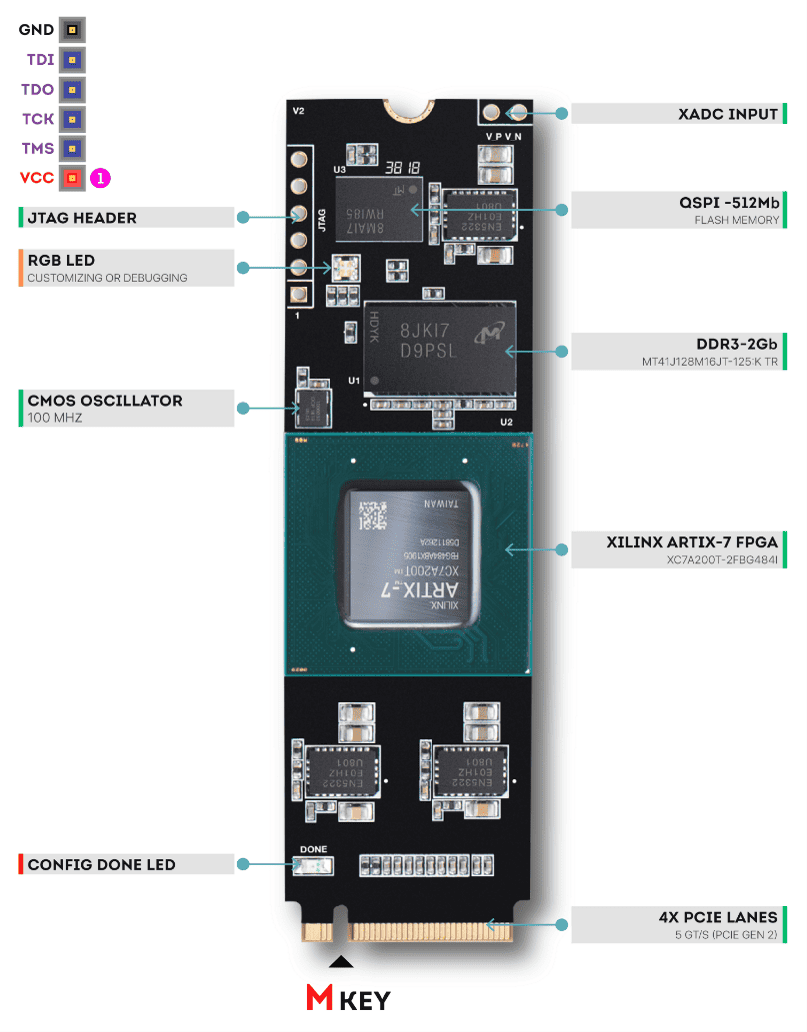Numato’s M.2 based Aller AMD Artix-7 FPGA module is a powerful and flexible hardware device designed for various hardware functions and applications. It integrates an AMDs Artix 7 FPGA onto a small M.2 form factor card, providing a customizable and reconfigurable platform for implementing a range of hardware designs.
Features: M.2 based Aller AMD Artix-7 FPGA module comes with several features that make it an ideal platform for hardware design and implementation. These features include:
- The module integrates an Artix 7 FPGA: XC7A200T-2FBG484I, which is a low-cost, low-power FPGA from Xilinx. It has a high logic density, a wide range of I/O interfaces, and a high-performance DSP slice.
- 2 Form Factor: The module has a compact M.2 form factor, which makes it easy to integrate into a variety of systems and devices. It supports the M.2 M-Key interface, which provides up to four high-speed PCIe x4 lanes.
- DDR3 Memory: The module comes with 2Gb DDR3 memory, which provides high-speed data transfer and storage.
- On-board Clock: The module has an on-board 100MHz clock, which provides accurate timing for hardware designs.
- In addition to the features mentioned earlier, the module also includes a Trusted Platform Module (TPM). The TPM is a secure cryptographic processor that provides hardware-based security features for the module and facilitates secure boot, secure storage, and cryptographic services to protect the module from unauthorized access and tampering.
Targeted Applications:
- Acceleration: One of the most common applications of the M.2 based Aller AMD Artix-7 FPGA module is in the field of machine learning. The module can be used to implement various machine learning algorithms, such as deep neural networks, convolutional neural networks, and recurrent neural networks. By offloading these algorithms to the FPGA, it is possible to achieve significant performance improvements compared to traditional CPU-based solutions.
- IoT Applications: The module can be used to implement various IoT applications, such as smart sensors and edge computing devices. By integrating the FPGA into the system, it is possible to provide real-time processing and analysis of sensor data, as well as support for custom interfaces and protocols.
- High-Security Applications: With the added TPM, it can be used in applications that require high levels of security, such as military and defence, financial services. It supports industry-standard security protocols, such as RSA, SHA-1, SHA-256, and AES, and is compliant with the Trusted Computing Group (TCG) TPM 1.2 specification.
- High-Frequency Trading: The module can be used in high-frequency trading (HFT) applications, where low-latency processing and high-speed data transfer are critical. By implementing trading algorithms on the FPGA, it is possible to achieve faster execution times and improved profitability.
Conclusion: M.2 based Aller AMD Artix-7 FPGA module is a powerful & flexible hardware device that can be used in a wide range of applications. Its compact form factor, high logic density, and wide range of I/O interfaces make it an ideal platform for hardware prototyping, IoT applications, video processing, high-frequency trading, and networking. With its powerful AMD’s Artix 7 FPGA and high-speed DDR3 memory, the module provides a customizable and reconfigurable platform for implementing a range of hardware designs. The addition of the Trusted Platform Module (TPM) adds an extra layer of security to the module, making it an ideal platform for applications that require secure and trusted hardware.
The module is now available for purchase at a sale price of $499.99 & ready to be delivered in 3-4 business days anywhere across the world — with volume discounts available upon request.
For further information or inquiries, please write to [email protected].
